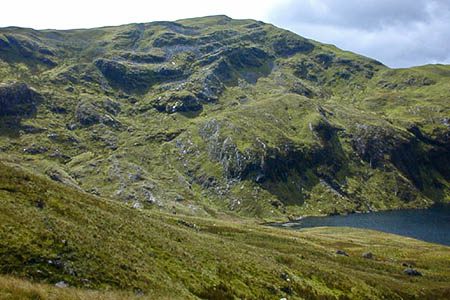A group of walkers, including one hypothermic woman, was rescued from a mid-Wales mountain in an eight-hour night-time operation involving more than 50 volunteer team members.
Rescuers said if the hypothermic walker had been found much later, there could have been a serious outcome.
Seven students from Manchester Metropolitan University called for help after getting into difficulties on Saturday on the 752m (2,467ft) Pumlumon Fawr mountain between Aberystwyth and Llanidloes.
Initial contact was made about 4.30pm and caused confusion as to the whereabouts of two of the party of seven. They told members of the Aberdyfi Search and Rescue Team they were on a mountain about a mile from Llanbrynmair, east of Machynlleth.
A team spokesperson said: “The verbal description of the casualties’ location did not match the map and so Sarloc was used to establish an accurate position.
“Sarloc, a recent innovation in mountain rescue, is a protocol for smartphone carrying casualties, and makes use of an internet link delivered by SMS. If a connection can be made, the website then quizzes the GPS function on the phone and sends an accurate position to the rescuers.
“The resulting grid reference placed the casualties more than 17km (11 miles) away from their reported location, near Pumlumon Fawr and in a position that matched their verbal description.”
Brecon, Central Beacons and Longtown Mountain Rescue Teams and Western Beacons Mountain Search and Rescue Team joined the operation to find the walkers on the mountain, also known by its Anglicised name Plynlimon.
A Brecon MRT spokesperson said: “The group, including students from Spain, Germany and Canada, had already walked 15km (nine miles) when two students became too tired to continue.
“The group split up; the two exhausted walkers remained on the north side of the mountain, the group leader set off to get help and the remaining four were given instructions to walk south towards a road and seek help.”
Dave Coombs, from Brecon Mountain Rescue Team, and incident manager, said: “The weather conditions were atrocious, with gales, sleet and driving rain and too severe for search and rescue helicopters to assist.
“One of the two casualties was suffering from hypothermia and needed to be carried by stretcher to waiting vehicles. She was treated by the Brecon MRT doctor who said that if she had been on the hillside for another hour, the outcome may have been different.
“The other casualty was cold but able to walk off with assistance.”
An Aberdyfi team spokesperson said: “Despite the high winds and driving rain the casualties were soon reached. Both were extremely cold, and were treated for the effects of hypothermia.
“With the provision of food, warm drinks and dry warm clothes, the man rewarmed sufficiently to be escorted off the hill on foot, but the woman remained in a poor state.
“In very cold patients, the act of walking can potentially initiate further complications and so it was decided to evacuate her by stretcher. Both casualties were down off the mountain by 10.30pm.
“In the meantime, another member of the party had turned up in Hafren Forest, some 6km (four miles) to the East of the casualty site, and it became apparent that a further four women from the party were unaccounted for.
“They had apparently intended to head due-south from the casualty site to meet the main road, but it was suggested they had neither map, compass nor lights.
“Other search parties started sweeping this area down to the main road while the stretcher party was busy with the evacuations, and once down off the hill these volunteers were re-tasked to join the search for the missing women.
“A party of ASART volunteers was deployed to sweep Hafren Forest, while another party searched a remote valley north of the casualty site.
“At around 1.30am this northern party located the women, who were cold but in reasonably good spirits. After giving them food and warm drinks, they were escorted out of the valley, and had reached vehicles at the road head by 3am.
Mr Coombs added: “We only had sketchy information on their location and the phone signal in the area was poor, making contact with them virtually impossible. Also they were unfamiliar with the terrain.”
He said they were found when rescuers saw the light from one of the group’s mobile phones.
The group had kept walking until it got dark and then huddled together to keep warm amongst some rocks 7km (four miles) north of their intended destination.
Mr Coombs said: “This was a particularly challenging rescue as the weather conditions were extreme and the terrain very difficult.
“Not all areas of Wales are well covered by the mobile communications network and it’s a timely reminder not to rely on phones to get you out of trouble.
“The students were lucky that the combined rescue teams found them when they did.
“The conditions were atrocious and it could have been much less of a happy ending had they had been on the mountain much longer.”
Graham O’Hanlon from ASART said: “If the vagaries of phone coverage had meant that Sarloc could not be deployed, then we would have started our search in completely the wrong place, and it is unlikely that we would have reached the casualties before the effects of the poor weather overtook them.
“Big thanks are due to the many volunteers from the five teams involved, many of whom would not have seen their beds much before 5am.”
